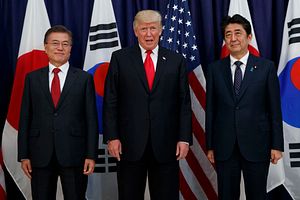This week, South Korean Prime Minister Lee Nak-yon traveled to Japan to attend Japanese Emperor Naruhito’s enthronement ceremony and met with Japanese Prime Minister Shinzo Abe. Lee is widely seen as a friend to Japan, and his visit appears to signal Seoul’s readiness to improve relations with Tokyo. Still, at this time, little to no progress has been made on the simmering trade war and historical grievances that once again threaten to overwhelm Japan-South Korea relations.
Despite sitting squarely within range of North Korea’s nuclear arsenal and sharing a vital interest in meeting this threat together, Japan and South Korea have plunged into a heated showdown over history and trade. A 2018 South Korean court decision ordering compensation by Japanese companies for forced labor during wartime, inflammatory rhetoric following Russian intrusion into airspace over the contested islands Dokdo/Takeshima, and mounting trade tensions have propelled relations between Japan and South Korea to their lowest point in decades.
If Japan and Korea are unable or unwilling to set aside their differences to ensure their own security in the face of the North Korean threat, what will happen to the U.S.-Japan-Korea trilateral relationship if the North Korea issue is resolved?
Regardless of the form peace takes on the peninsula, with a resolution between North and South Korea, external security concerns will likely provide less incentive for Japanese and Korean security cooperation. In fact, peace on the Korean Peninsula may actually lead to increased Japan-Korea tensions.
A resolution between North and South Korea will likely require the formulation of a new “Korean identity” that reconciles over seventy years of divergent historical and social narratives in the North and South. In the past, leaders in both Koreas have used anti-Japanese sentiment to stoke the flames of nationalism and unite people in opposition to a common enemy. Japan will be an easy target for Korean leaders looking to bridge the gaps and build a new, shared identity between the two Koreas.
Unfortunately, following a resolution of the North Korean nuclear issue, the threat of a rising China will not necessarily incentivize continued security cooperation between Japan and Korea in the face of increased nationalist agitation on the peninsula. Today, experts disagree over where Japan and South Korea might fall in a potential great power conflict between China and the United States, and a unified or otherwise peaceful Korean Peninsula would introduce even more uncertainty into the mix. Without intentional policymaking that recognizes the importance of equipping the trilateral alliance for future threats, the United States may find itself tightrope walking between two disparate actors who share little common ground.
The United States should take immediate action to improve Japan-South Korea relations, with the understanding that a peaceful resolution on the Korean Peninsula could lead to weakened U.S.-Japan-Korea trilateral cooperation in Northeast Asia. The United States will need Japan and Korea to be on the same page as it reckons with a shifting geopolitical landscape in Northeast Asia, but if Japan and South Korea cannot get along now, it is almost certain that they will be unable to do so if the North Korean threat is resolved.
In the short term, the United States should help Japan and South Korea relegate history issues to the past, address the economic tensions these conflicts have caused, and refocus trilateral dialogue on the threat of North Korea.
As the United States and its allies continue to work toward building peace on Korean Peninsula, the United States should also consider the future role Japan might play once peace is achieved.
The United States should recruit Japan as an active investment partner in building infrastructure in North Korea to promote further regional integration between Japan and the Korean Peninsula.
Political or social integration of the two Koreas should also include educational opportunities for those who have lived in the North to learn the value of the Japan-Korea partnership, and opportunities for government, student, and business exchanges between the countries.
Finally, the United States should build a vision for the future of the U.S.-Japan-Korea trilateral relationship that clearly defines shared threats, interests, and areas for cooperation.
To ensure the continued strength of the U.S. presence in Asia, the United States should prepare now for the impact a peaceful Korean Peninsula might have on already tumultuous Japan-South Korea relations.
Ellen Swicord is a research associate for Korea studies at the Council on Foreign Relations.

































